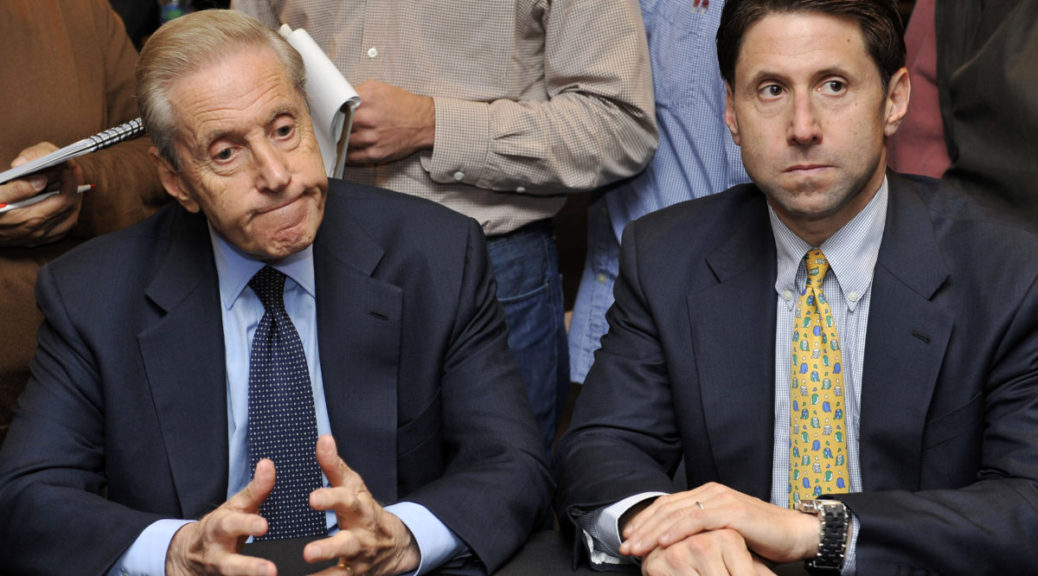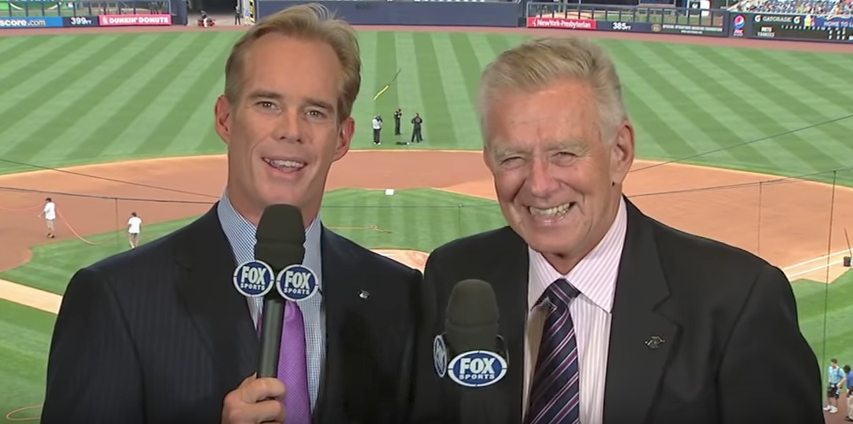Most dynasties are marked by monuments they built, but the Wilpon family’s reign over the New York Metropolitans will be noted by the many glaring absences they will leave behind. The dearth of championship banners flying over Citi Field. The complete lack of any team iconography in the entrance to that stadium, an ersatz Ebbetts Field by way of a suburban outlet mall that attempted to recreate the Parthenon but landed closer to a Cheesecake Factory. The continued absence of any statuary to commemorate the franchise’s greatest player, its construction and installation delayed multiple times and still in the earliest of planning stages when that player passed away suddenly this year.
When the Wilpons finally take Steve Cohen’s money and run, however, the most pronounced absence left in their wake will remain in the front office, a black hole from which no original thought may escape. During the entirety of their run as the team’s principal owners, the Mets were never able to attract top-level executive talent, a failure that can be laid squarely at their feet, for it’s clear they never intended to have a front office do anything but their bidding.
Fred Wilpon, a minority partner in the purchase of the Mets in 1980, maneuvered his way into 50 percent ownership of the team by 1986 via contractual trickery worthy of the cutthroat New York real estate world in which he’d made his fortune. He further cemented his control of the team in the early 1990s when he threw his lot in with Bud Selig’s coup against MLB commissioner Fay Vincent. (Co-owner Nelson Doubleday backed Vincent.) When Selig came out on top in that struggle, Wilpon was tacitly given the new commish’s imprimatur to take over the Mets’ day-to-day operations.
The first real sign of how Wilpon intended to run the Mets didn’t come until mid-season in 1997, when his hand-picked general manager Steve Phillips ascended to the throne. What was most telling was how Wilpon touted the “skills set” Phillips would bring to the job, skills the owner deemed lacking in his predecessor, Joe McIlvaine. Whereas McIlvaine was rooted in the world of scouting and development, Phillips owned a degree in psychology (from Michigan, Wilpon’s beloved alma mater) and had years of experience as a motivational speaker. He was a much more polished corporate product for an increasingly corporate sport, able to charm the press with his well-coiffed head of hair and the practiced tone of a spin doctor. “There is no question about it, that being the point person for the organization, making the decisions and discussing the decisions, I think is a vital aspect of the job, and a skill that is necessary to do it,” Wilpon noted when announcing the hire. From the start, it seemed Phillips was chosen not for what decisions he would make as GM, but how well he could sell those decisions to the press and fans.
As the kicking of McIlvaine to the curb implied, player development would not be high on the list of Mets’ front office priorities as long as Fred Wilpon was in charge. The decade that followed Phillips’s hire was marked by a gigantomania worthy of a Soviet central planner, with massive free agent signings and multi-team trades for expensive veterans exploding payroll to previously undreamt of levels. Phillips set the tone early for the Mets’ front office in the Wilpon era; he rarely spoke of prospects, except when fluffing up their reps to pave the way for future deals. Occasionally a beat writer would point out the inconvenient fact that the Mets roster was weighted toward age rather than youth, that any window the team had for success would be short and could be made even shorter by an unforeseen injury. The reaction to these charges from Phillips, and most of his successors, was, Yeah, so? Long-term planning extended no further than game 162, because anything beyond that involved the quantum world of player development, where no outcome was assured. A polished Steve Phillips was far more equipped to explain why he’d traded for a 30-something power hitter whose best years might be behind him than to discuss why a high draft pick had not panned out. For most of the Wilpon years, the latter eventuality never occurred because so few Mets draft picks made the bigs before being traded elsewhere.
The Mets were not alone in this approach at the time, for this was the conventional wisdom in baseball for team planning in the late 1990s: spend today, if you can afford to, and cry tomorrow. And truth be told, it worked during the early Phillips years, to the tune of a pair of playoff appearances (1999 and 2000), attendance that rivalled the Yankees’, and a Mets cap on Mike Piazza’s Hall of Fame plaque.
The problem was, as the game evolved, the front office did not. By the early 2000s, the unsustainability of spending to contend was beginning to be recognized, and by the end of the decade nearly all of baseball was learning to adapt to this reality in varying ways, whether through a renewed focus on player development or using statistics to “exploit market inefficiencies.” The Mets were a notable, stubborn exception. GMs changed but the team building philosophy remained the same, and since the only other thing that remained the same was the owner, it was hard to argue that anyone but the owner was to blame. Regardless of who was ostensibly in charge of the front office, the Mets’ decisions betrayed Fred Wilpon’s unique condition: if you have unlimited credit, every problem looks like a price tag.
Case in point: After the 2002 season, the Mets were on a managerial hunt, looking to turn the page on the chaotic Bobby Valentine era. Their answer? Spend a great deal of money hiring Art Howe, the former Oakland skipper. While it was not the worst or most damaging signing of Steve Phillips’s tenure (take your pick), it betrayed the sheer lack of brainpower in the Mets organization at the time. Howe may have gotten a raw deal from his portrayal in Moneyball and the subsequent movie that dramatized it, but imagine studying the overachieving A’s teams of that era and deciding the best thing to take from them was Art Howe.
The true giveaway as to the real culprit for these miscues is that such baffling decisions continued to be made after Phillips’s ouster in 2003. The Victor Zambrano for Scott Kazmir trade by GM Jim Duquette in 2004 will be studied by future generations, and I’m sure they will suspect it’s an urban legend or ghost story instead of a very real atrocity. Duquette’s successor, Omar Minaya, once had a well-earned reputation as a keen spotter and developer of talent and had long dined out on the fact that he’d seen potential no one else had in a scrawny Dominican teenager named Sammy Sosa. Yet, when he was named Mets GM, he too signed and traded with Phillipsian ardor. And like Phillips, his efforts were rewarded (most of the 2006 season) until they weren’t, when he discovered that starting pitchers north of 35 years old have a shelf life comparable to heavy cream, that leaning on your bullpen might work for one season but two is pushing it, and that a seven-game lead in September is not as large as it looks. Duquette and Minaya had little in common, except that both their paychecks were once signed by Wilpon.
The Mets’ money eventually ran out, thanks to Bernie Madoff, and it was at that unlucky point that they were essentially forced by Fred Wilpon’s old chum Bud Selig to hire Sandy Alderson as their new GM. As the Iggy Pop to Billy Beane’s Ramones, Alderson had a measure of independence from Wilpon due to his stature in the game and the fact that, for all intents and purposes, he worked for the commissioner’s office rather than the Mets. With no opportunity to spend for spending’s sake, Alderson’s years were marked by attempts to build up a bereft farm system via draft picks (which yielded Pete Alonso, Michael Conforto, and Brandon Nimmo, among others) and swaps of pricey vets for prospects (Carlos Beltran for Zack Wheeler, R.A. Dickey for a package that included Noah Syndergaard). His only “big deal” in eight years as GM, the deadline trade for Yoenis Cespedes in 2015, propelled the Mets to a surprise trip to the World Series that season.
What was Alderson’s reward for this service? When he left the team midway through the 2018 season to seek cancer treatment, Jeff Wilpon—son of Fred and team COO—grumbled to the press that the Mets’ lack of spending in the last decade was Alderson’s fault. This assertion was absurd on its surface, but even more galling was the fact that Alderson had in fact asked for more spending—on an analytics department, a request the Wilpons turned down flatly, opting instead to hand off analytic tasks to unpaid interns. This decision both saved the Wilpons’ bottom line and ensured that any analytic recommendations would come from so far down the organizational totem pole that they could be safely ignored by ownership. Fred Wilpon and his son had no interest in analyzing anything farther than their own hunches.
What this made abundantly clear—if the evidence from Steve Phillips forward hadn’t already—was that what Wilpon wanted was not an executive, but a mouthpiece. The problem for Wilpon was that, in the time since he’d taken over control of the team, and thanks in large part to Moneyball and the explosion of statistical analysis that followed, GMs had become desired talent almost on par with the players, and no talent of any note needed to be satisfied with mere mouthpiece duty. When the Mets searched for a replacement for Alderson after the 2018 season, few of the rumored prospects would have been considered up-and-coming baseball executive talent or possessed of any sabermetric chops, and those who were (Chaim Bloom, Kim Ng) were quickly eliminated from the running. The team settled on Brodie Van Wagenen, a former players’ agent whose first two seasons on the job were marked by prospect-shedding deals that reeked of Wilponian influence. Plus ça change…
Of all the malign influences the Wilpon regime had on the Mets, this might be the worst. It’s true enough that, even with a top executive steering the ship, a team needs many events to break just the right way to win, and even more to sustain winning for multiple seasons. For every Theo Epstein, there are piles of GMs who sought to “rescue” a long suffering team and failed. What’s remarkable is not that no one has “rescued” the Mets, but that no one wants to try. It’s difficult to believe that the chance to bring a championship to a team that plays in the media capital of the world has attracted no great mind, has inspired no brilliant person to rise to the challenge.
Then you remember that team was run for so many years by the Wilpons, who wanted no general manager, wanted nothing more than a blank space to speak their ancient visions into, and you wonder no more why you, and the team you love, feel so empty.


